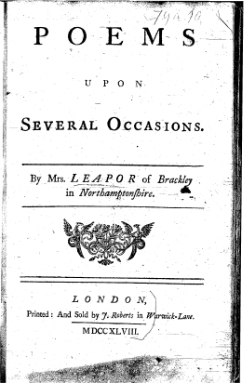
Poems Upon Several Occasions (1748) by Mary Leapor
Mary Leapor 1722–1746 was an English poet, born in Marston St. Lawrence, Northamptonshire. She was considered remarkable for being a talented working-class writer of the time. Partly self-educated, she may have received some training at a local Dame school, or at the local free school. Her father remembered that she began writing poetry at the age of 10; he recollected ‘She would often be scribbling, and sometimes in Rhyme’. Her mother discouraged the writing, insisting that her daughter find some ‘more profitable employment’. Mary was hired as kitchen maid with an employer, Susanna Jennens, who encouraged the girl’s writing and allowed her the use of her library. Jennens wrote poetry herself and had connections to Mary Astell and Lady Mary Wortley Montagu, both distinguished learned women. Not all employers were so accepting; Leapor’s devotion to writing led to her dismissal from a later position in an aristocratic family; she would not stop writing even in the kitchen. After returning home in 1744 to care for her widowed father, she met Bridget Freemantle who became her friend and mentor. Freemantle suggested she publish a volume of poetry by subscription to support the effort, but before this could be arranged, Leapor died of measles, aged twenty-four. Freemantle arranged the posthumous publication of Poems upon Several Occasions in 1748 that six hundred people bought. A second volume of poetry and drama was published three years later.
From Leapor’s ‘An Essay on Woman’:
WOMAN-a pleasing but a short-lived flower,
Too soft for business and too weak for power:
A wife in bondage, or neglected maid;
Despised if ugly; if she’s fair-betrayed.
Tags: Enlightenment, Europe, Poets